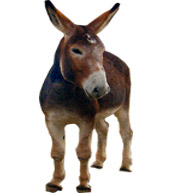
The donkey is believed to be originally from Southern and Central Asia, but
it is now used as a working animal around the world. The donkey belongs to the
horse family. Donkeys are very much herd animals. They're also very smart and
learn things easily - and they don't forget what they've learned. Unlike horse
fur, donkey fur is not waterproof, and so they must have shelter when it rains.
The average donkey stands 40 inches (102 centimeters) at the shoulder, but
different breeds vary greatly in size and shape. Donkeys have developed very
loud vocalizations, which help keep in contact with other donkeys over the wide
spaces of the desert. In today’s time, there are about 40 million donkeys
living in this world. The donkey usually feeds on coarse food.
It is a patient and hardworking animal and people make use of donkey by making
them carry heavy loads. Donkeys in the wild can defend themselves with a powerful
kick of their hind legs as well as by biting and striking with their front feet.
The donkey responds to gentle treatment with affection and shows attachment
to its master. Their most common role is for transport, whether riding, pack
transport, or pulling carts.
They may also be used for farm tillage, threshing, raising water, milling,
and other jobs. Other donkeys are used to sire mules, as companions for horses,
to guard sheep, and as pets. A few are milked or raised for meat. The largest
is the Donkey Sanctuary of England, which also supports donkey welfare projects
in Egypt, Ethiopia, India, Kenya, and Mexico.







